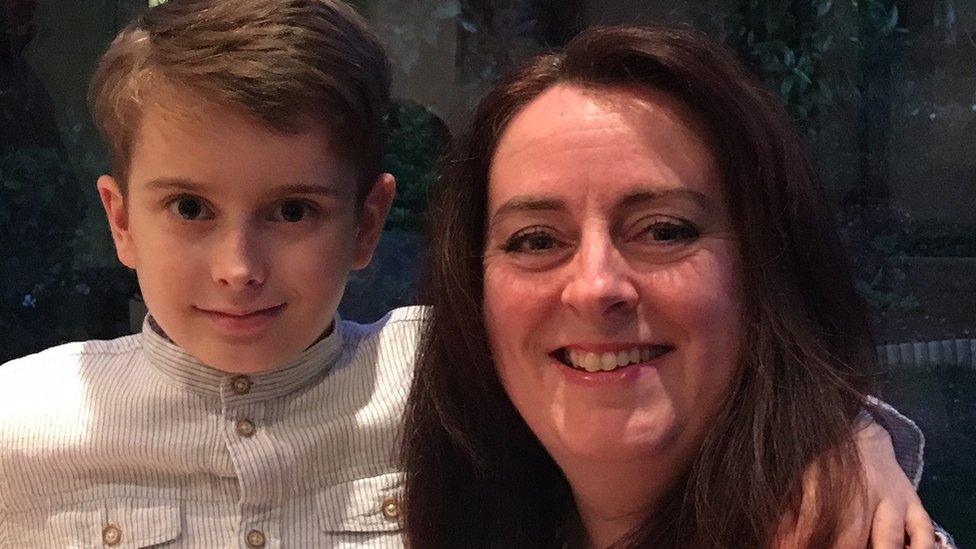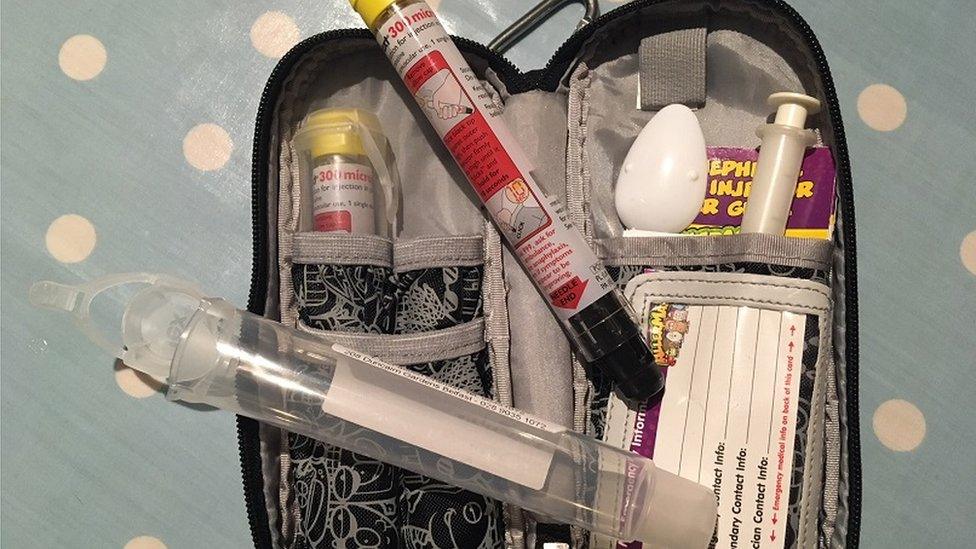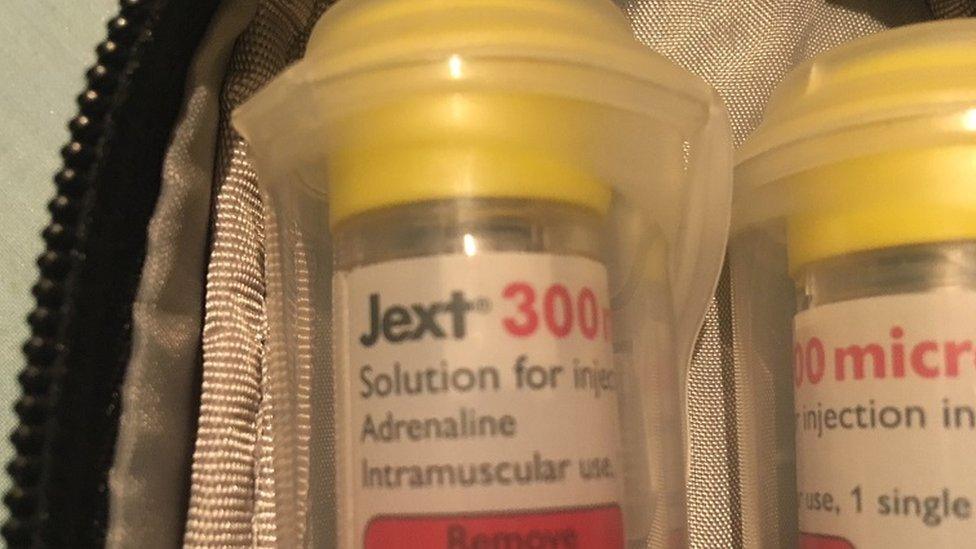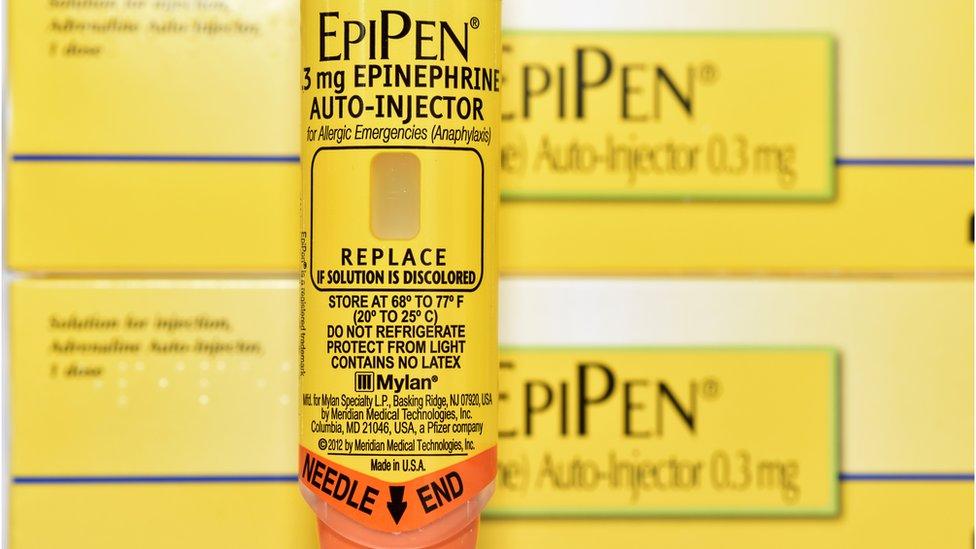EpiPen shortage endangering lives warns Belfast mum
- Published

Michelle Henry and her son Darragh, who she said has been described as having a "full Monty" of allergies
The mother of a nine-year-old boy with life-threatening allergies has warned that a shortage of adrenaline pens is putting her son and thousands like him in danger.
Michelle Henry's son Darragh has multiple allergies to food, the environment and medicine.
But problems in the production of EpiPen have led to a shortage.
The Department of Health has said there are two alternative adrenaline auto-injector products available in the UK.
EpiPen is the biggest brand of adrenaline auto-injector on the market.
The distributors, Mylan, said supply problems were due to manufacturing issues.
But the shortages have had a knock-on effect on alternative products Jext and Emerade.
The Pharmaceutical Service Negotiation Committee (PSNC), which negotiates with the government and NHS on behalf of pharmacies, said the supply of other products is likely to be constrained until the EpiPen situation has been resolved.

Some of the Darragh Henry's medical kit
Michelle Henry, who lives with her family in Belfast, said her son Darragh has been referred to as "the full Monty" by a consultant because of "the multitude of allergies".
"I carry a medical pack for Darragh, with adrenaline pens, antihistamines and lots of other inhalers and tummy medicines," she said.
Darragh's allergies are so extreme he once stopped breathing after omelettes were served on a flight.
'Most important thing'
The vapours from the cooked eggs, released when other passengers around the family opened the meal packaging, were enough to trigger a reaction.
"I had everything out of the medipack and thankfully he was fine," Michelle recalled.
After difficulties getting EpiPens three years ago, Darragh now uses one of the alternatives and the family keeps six of the pens at any one time.

With the EpiPen shortage continuing, the Henry family switched to an alternative - Jext
Darragh carries two, as does his mother, and two are left at his school. Other children may need as many as 10, if they go to childcare facilities or spend time at their grandparents.
"Adrenaline pens are the one most important thing in your medical kit to save your child or an adult in a severe anaphylactic situation," said Michelle.
"Good practice dictates you should have two adrenaline pens, in case a double dose is required and also in case you have a problem with that first pen - a needle breaks, it doesn't inject the adrenaline as it should do."
'Increasing problem'
The manufacturers have said additional supplies of the two alternatives are expected by the end of this month, while the supply of EpiPen is expected to stabilise towards the end of the year.
But Michelle is not convinced.
"I had a personal experience this year at Easter and, believe you me, it took two days of e-mails and phone calls to the headquarters of manufacturers of adrenaline pens to actually find out the timescale for the reissue of the new pens," she said.

EpiPen is the biggest brand of adrenaline auto-injector on the market
"Two to three years ago I was faced with the exact same problem and I understand there's a current issue, so it's not a one-off.
"If you ask me, it's actually an increasing problem.
"Three years ago, when I couldn't get a replacement EpiPen, I switched to Jext. And that was fine whenever there was an alternative there.
"But the situation we're faced with this year is that even the alternative has run dry and even the third alternative, which is a lesser-known brand, has run dry.
"The only other option open to parents is actually getting adrenaline and drawing it up in a syringe.
"These pens are life-saving. They make it easy for you not to have to think as a parent or a carer in a situation where your child has collapsed - and I have seen my child in such a situation.
"It's just not good enough."
'Tip of the iceberg'
Mylan said pharmaceutical company Pfizer was "working hard" to increase production and supply would stabilise towards the end of the year.
Gerard Greene, chief executive of Community Pharmacy NI, said Northern Ireland pharmacies were dealing with supply problems every day.
"The issue with EpiPens is only the tip of the iceberg, because this extends to many, many commonly prescribed drugs and there are real concerns within the pharmacy sector that this is a situation that could develop further and deteriorate," said Mr Greene.
"If you were to go into any pharmacy and ask them: 'Do you have problems getting drugs into your pharmacy?' they will undoubtedly say emphatically yes - generic drugs and branded medicines as well.
"In a typical month, there are probably at least 30 drugs that are causing supply problems for generics - there's blood pressure medication, there's mental health medication."
In a statement, the Department of Health said it was "aware of an ongoing issue with intermittent supply constraints of EpiPen 0.3mg and EpiPen Jr 0.15mg Adrenaline Auto-Injectors due to manufacturing delays.
"It is unable to make any specific treatment recommendation to individual patients but would advise that there are two alternative adrenaline auto-injector products available in the UK.
"Patients who are concerned about the current supply constraints of EpiPens should speak to their GP practice regarding the possibility of alternative treatments.
"The Health and Social Care Board (HSCB) is actively monitoring the availability of all adrenaline auto-injectors in conjunction with wholesalers, and has issued advice to prescribers and community pharmacies in Northern Ireland."
- Published25 September 2018
